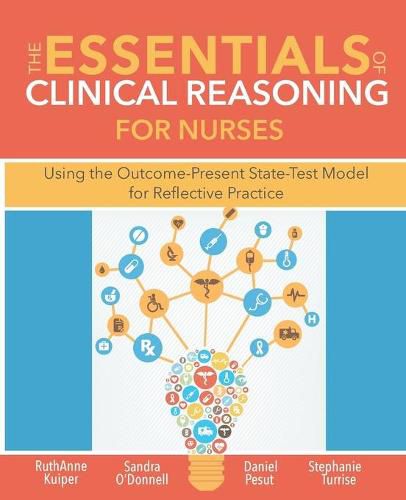Readings Newsletter
Become a Readings Member to make your shopping experience even easier.
Sign in or sign up for free!
You’re not far away from qualifying for FREE standard shipping within Australia
You’ve qualified for FREE standard shipping within Australia
The cart is loading…






This title is printed to order. This book may have been self-published. If so, we cannot guarantee the quality of the content. In the main most books will have gone through the editing process however some may not. We therefore suggest that you be aware of this before ordering this book. If in doubt check either the author or publisher’s details as we are unable to accept any returns unless they are faulty. Please contact us if you have any questions.
In today’s healthcare environment of scarce resources and challenges related to safety and quality, nurses must make decisions after decision to ensure timely, accurate, and efficient provision of care. Solid decision-making, or lack thereof, can significantly affect patient care and outcomes.
Clinical reasoning-how a nurse processes information and chooses what action to take-is a skill vital to nursing practice and split-second decisions. And yet, developing the clinical reasoning to make good decisions takes time, education, experience, patience, and reflection. Along the way, nurses can benefit from a successful, practical model that demystifies and advances clinical reasoning skills.
The Essentials of Clinical Reasoning for Nurses, authors RuthAnne Kuiper, Sandra O'Donnell, Daniel Pesut, and Stephanie Turrise provide a model that supports learning and teaching clinical reasoning, development of reflective and complex thinking, clinical supervision, and care planning through scenarios, diagnostic cues, case webs, and more. The widely acclaimed Outcome-Present State-Test (OPT) Model serves a both a method for self-regulation in nursing and as a patient-center clinical reasoning model for aspiring and practicing nurses. This book is a must-have resource for nurse educators, clinicians, managers, administrators, and students who want to develop, hone, and fine-tune their clinical reasoning skills.
$9.00 standard shipping within Australia
FREE standard shipping within Australia for orders over $100.00
Express & International shipping calculated at checkout
This title is printed to order. This book may have been self-published. If so, we cannot guarantee the quality of the content. In the main most books will have gone through the editing process however some may not. We therefore suggest that you be aware of this before ordering this book. If in doubt check either the author or publisher’s details as we are unable to accept any returns unless they are faulty. Please contact us if you have any questions.
In today’s healthcare environment of scarce resources and challenges related to safety and quality, nurses must make decisions after decision to ensure timely, accurate, and efficient provision of care. Solid decision-making, or lack thereof, can significantly affect patient care and outcomes.
Clinical reasoning-how a nurse processes information and chooses what action to take-is a skill vital to nursing practice and split-second decisions. And yet, developing the clinical reasoning to make good decisions takes time, education, experience, patience, and reflection. Along the way, nurses can benefit from a successful, practical model that demystifies and advances clinical reasoning skills.
The Essentials of Clinical Reasoning for Nurses, authors RuthAnne Kuiper, Sandra O'Donnell, Daniel Pesut, and Stephanie Turrise provide a model that supports learning and teaching clinical reasoning, development of reflective and complex thinking, clinical supervision, and care planning through scenarios, diagnostic cues, case webs, and more. The widely acclaimed Outcome-Present State-Test (OPT) Model serves a both a method for self-regulation in nursing and as a patient-center clinical reasoning model for aspiring and practicing nurses. This book is a must-have resource for nurse educators, clinicians, managers, administrators, and students who want to develop, hone, and fine-tune their clinical reasoning skills.